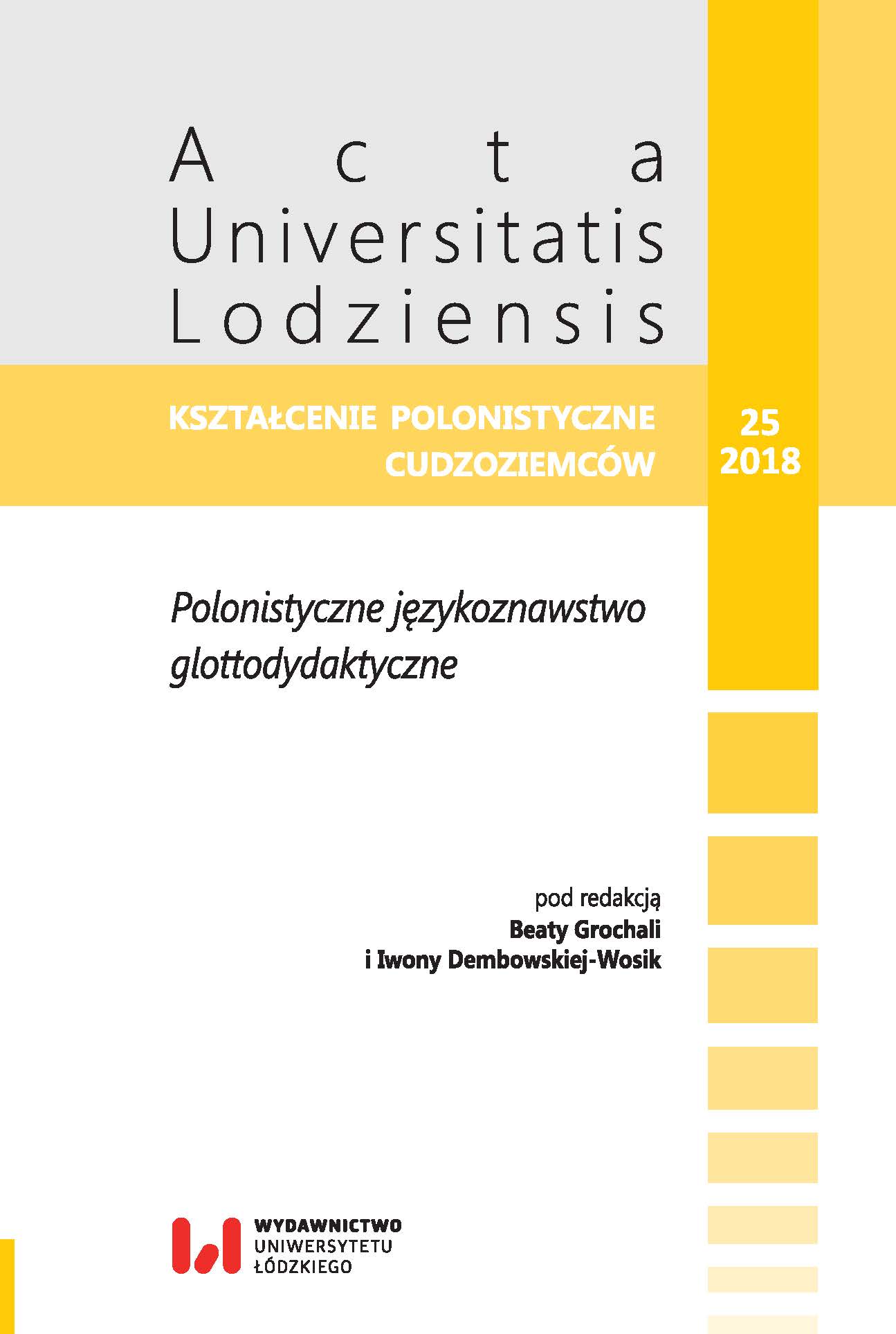Linguistic and communicative features of instructions in selected didactic materials for learning Polish as a foreign language
DOI:
https://doi.org/10.18778/0860-6587.25.11Keywords:
instruction, official instruction, didactic instruction, teaching Polish as foreign language, pragmalinguisticsAbstract
The starting point for this article are postulates presented more than 20 years ago by Anna Burzyńska (1998) in a publication devoted to didactic instruction. The development of linguistics and changes in glottodidactics that have taken place since that time justify the resumption of such research. In the first part of the article, theoretical and descriptive, the genre of instruction is described from the point of view of pragmalinguistics (as a speech act) and its communicative features (in an official and didactic situation). The second part presents the results of the analysis of instructions found in selected textbooks and exercise books for learning Polish as a foreign language at the elementary and intermediate level. Both parts form the foundation for formulating the final conclusions. The main conclusion formulated in the article is that didactic instructions in textbooks and exercise books are potential speech acts, implemented each time in a particular didactic situation, and their schematism is not a disadvantage, but a desirable feature; this applies to the formal features of instructions and names of activities that help in teaching basic language skills, while the objects of these activities (texts, content of exercise and tasks, etc.) are (should be) novel.
References
L: P. Lewiński: Oto polska mowa, Wrocław 2001.
Google Scholar
M/M: A. Madeja, B. Morcinek, Polski mniej obcy, Poziom średnio ogólny (B2), cz. 1, Katowice 2007.
Google Scholar
S/K/G: I. Stempek, P. Kuc, M. Grudzień, Polski 1. Krok po kroku. Junior. Zeszyt ćwiczeń. Poziom 1 (A1), Kraków 2016.
Google Scholar
J/P: A. Janowska, M. Pastuchowa, Dzień dobry!, Poziom podstawowy A1, Tarnów 2009.
Google Scholar
Burzyńska A. B., 1998, Polecenia dydaktyczne w podręcznikach do nauczania języka polskiego jako obcego na poziomie średnim, „Acta Universitatis Lodziensis. Kształcenie Polonistyczne Cudzoziemców”, t. 10, B. Ostromęcka-Frączak (red.), s. 5–12.
Google Scholar
Grzegorczykowa R., 1991, Problem funkcji języka i tekstu w świetle teorii aktów mowy, „Język a kultura”, t. 2., J. Bartmiński, R. Grzegorczykowa (red.), Wrocław, s. 11–28.
Google Scholar
Kodeks pracy, online: http://prawo.sejm.gov.pl/isap.nsf/download.xsp/WDU19740240141/U/D19740141Lj.pdf [15.06.2018].
Google Scholar
Malinowska E., 2001, Wypowiedzi administracyjne – struktura i pragmatyka, Opole.
Google Scholar
Marcjanik M., 2017, Słownik językowego savoir-vivre’u, Warszawa.
Google Scholar
Martyniuk W., 1991, Mów do mnie jeszcze, Kraków.
Google Scholar
Polecenie służbowe w administracji, online: http://samorzad.infor.pl/sektor/organizacja/pracownicy/670873,Polecenie-sluzbowe-w-administracji.html [15.06.2018].
Google Scholar
Polecenie służbowe w orzecznictwie SN, 2010, online: www.prawo.egospodarka.pl/52050,Polecenie-sluzbowe-w-orzecznictwie-SN,1,34,3.html [15.06.2018].
Google Scholar
Seretny A., Lipińska E., 2005, ABC nauczania metodyki języka polskiego jako obcego, Kraków.
Google Scholar
SJP Dor.: Słownik języka polskiego, red. W. Doroszewski, https://sjp.pwn.pl/doroszewski/lista [22.10.2018].
Google Scholar
SJP PWN, Słownik języka polskiego PWN, https://sjp.pwn.pl/ [22.10.2018].
Google Scholar
Ustawa z 16 września 1982 r. o pracownikach urzędów państwowych, w: Dz.U. z 1982 r., nr 31, poz. 214.
Google Scholar
Ustawa z 22 marca 1990 r. o pracownikach samorządowych, w: Dz.U. z 2001 r., nr 142, poz. 1593.
Google Scholar
Wierzbicka A., 1999, Język – umysł – kultura, Warszawa.
Google Scholar
Downloads
Published
How to Cite
Issue
Section
License

This work is licensed under a Creative Commons Attribution-NonCommercial-NoDerivatives 4.0 International License.










